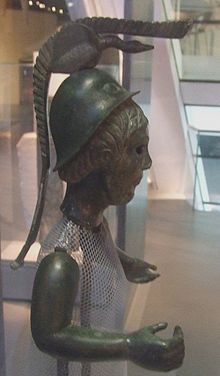- Brigantia
-
Brigantia, seltener auch Brigindo, Bricta oder Brixia, ist eine weibliche keltische Gottheit. Der Name Brigantia bedeutet „die Leuchtende“ oder „die Erhabene“.
Inhaltsverzeichnis
Mythologie
Brigantia war zur Zeit der Römerherrschaft die Stammesgöttin des keltischen Stammes der Briganten, von denen verschiedene Stammesverbände sowohl in Britannien als auch in Gallien und der Gallia Belgica ansässig waren. Dargestellt wurde sie oft als ernst blickende junge Frau mit Helm, Speer, Schild und Rüstung. Brigantia wurde aber auch als Nymphe bezeichnet – wohl weil sie als Gottheit des Landes und als Flussgöttin des Afon Braint[1] und des River Brent[2] galt. Obwohl sie hauptsächlich in Britannien verehrt wurde, wie zahlreiche Inschriften bezeugen, war ihr Kult wahrscheinlich auch auf dem Festland bekannt.[3]
Die irische Sagengestalt Brigid oder Brig geht sehr wahrscheinlich auf die Göttin Brigantia zurück, deren Kult britische Seefahrer oder Eroberer nach Irland gebracht haben könnten.[4]
In der Interpretatio Romana wird Brigantia mit Minerva („keltische Minerva“) aber auch Victoria gleichgestellt und trägt auf einem Relief wie diese die Insignien Mauerkrone, Speer und Gorgonenschild.[3] Aus der Zeit des Antoninus Pius ist in Cumberland (England) eine Anrufung als Heil-Göttin Dea Nympha Brigantia überliefert.[5] Im römischen Kastell Blatobulgium im schottischen Birrens (Dumfries and Galloway, gälisch: Dùn Phris agus an Gall-Ghaidhealaibh) ist eine Weihestätte aus dem 2. Jahrhundert der Brigantia erhalten, auf der sie mit Minervas Mauerkrone und Victorias Schwingen gezeigt wird.[6] Als Schlacht- und Siegesgöttin wird sie mit Victoria auf zwei Inschriften (Roman Inscriptions of Britain RIB 627 und RIB 628), auf einer mit der nordafrikanische Mondgöttin Dea Caelestis (RIB 1131) verglichen
Ihr männliches Pendant ist der Gott Briganitius, über den nur sehr wenig bekannt ist.
Siehe auch
Literatur
- Helmut Birkhan: Kelten. Versuch einer Gesamtdarstellung ihrer Kultur. Verlag der Österreichischen Akademie der Wissenschaften, Wien 1997, ISBN 3-7001-2609-3.
- Bernhard Maier: 'Lexikon der keltischen Religion und Kultur. Kröner, Stuttgart 1994, ISBN 3-520-46601-5, S. 54.
Weblinks
Einzelnachweise
- ↑ Isle of Anglesey, County Llanfairpwllgwyngyll
- ↑ Nebenfluss der Themse
- ↑ a b Helmut Birkhan: Kelten. Versuch einer Gesamtdarstellung ihrer Kultur. Verlag der Österreichischen Akademie der Wissenschaften, Wien 1997, ISBN 3-7001-2609-3, S. 614 f.
- ↑ Michael Richter: Irland im Mittelalter, Kultur und Geschichte. Verlag C.H. Beck, München 1996, ISBN 3-406-40481-2, S. 38 f.
- ↑ R.G.Collingwood/R.P.Wright: The Roman Inscriptions of Britain'.' Oxford 1965, Nr. 2066.
- ↑ CIL 07, 1062 Brigantiae s(acrum) Amandus / arc(h)itectus ex imperio imp(eratum) [f(ecit)]
Kategorien:- Keltische Gottheit
- Weibliche Gottheit
- Keltische Mythologie
Wikimedia Foundation.

